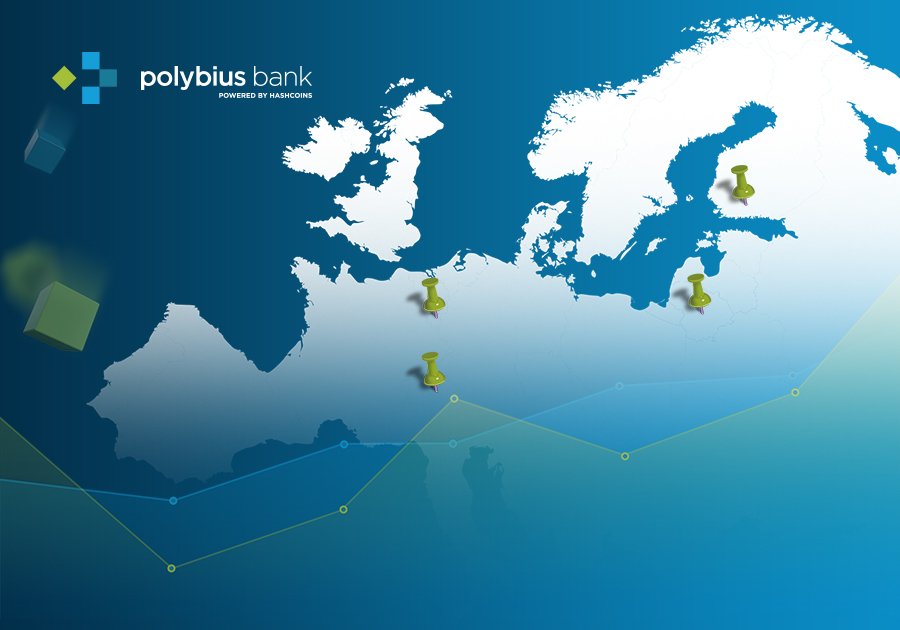Polybius

We have already decided on our shortlist: Lithuania, Luxembourg, Finland and Switzerland, but the most interesting is yet to come. How to choose a country in which our office will be, in which there will be our core of employees, in which we will pay taxes and before which regulators to report – our today’s slightly ethnographic post.
With what it is necessary to begin
The license of the Polybius financial institution will be received after the ICO, because there are several types of such licenses, and only by the results of the public posting of our tokens it will be clear to which of them we submit, in the end, the application.
Lyrical digression: ICO – Initial Coin Offering, crypto-analogue IPO (share placement). This kraudfandingovaya campaign using crypto currency, usually organized by cryptostarts or block projects. The goal of ICO Polybius will be to raise funds for the launch of cryptobank for all categories of the population and business. ICO “Polybius” starts before the end of spring 2017 and will last five weeks. The goal of the campaign is to raise from $ 1.5 million to $ 25 million to launch the bank and additional projects listed in the Polybius road map. ICO participants will be able to buy invest-tokens for crypto currency or regular money, guaranteeing them a proportional share in the profits of Polybius Bank.
Actually, the results of the ICO will be the final factor in choosing the country of incorporation of Polybius Bank. We can say that these will be the results of our Oscar, when we will announce who won. In the meantime, let us tell you what exactly these countries deserved their nominations, and the reader himself will be able to decide who has any chances to win.
We reduced the list of criteria by which we will make a decision to the following four points:
- Loyalty to cryptostarts, loyalty to fintek
- The tax rate
- Presence of the staff
- Access to markets
Consider them in order.
Loyalty to fintek and cryptoprojects
Since this was the criterion of primary selection, it goes without saying that Lithuania, Luxembourg, Finland, and Switzerland pass through it without any questions – on it, in fact, they were chosen.
We wrote about the Fintek-orientation of Lithuania in our blog before. Like the other small Baltic country, Estonia, having gained independence 26 years ago, Lithuania has found itself in a big and interesting world where everything has to be achieved by oneself. But if the Estonians decided that their theme in the international division of labor would be the construction of an electronic state – perhaps the most advanced at the moment, the Lithuanians decided to occupy the niche of the fintek-friendly territory. And they are still doing very well: we are familiar with the Lithuanian Central Bank directly, through HashCoins, who planned and discussed with them a number of joint projects on the blockhouse – that’s why we consider Lithuania seriously as one of the main variants of the incorporation of Polybius
] Switzerland’s ambitions are even more serious: the country of the hours and the most satisfied alpine cows in the world does not rest on the laurels of the most respectable banking business of the planet, but aspires to keep pace with the times and claims to be a technological hub for start-ups. You know this if you heard about the “cryptololin in the canton of Zug” – a non-profit association lobbying the interests of crypto business and block projects. Today in the canton of Zug are such giants of the cryptomir as Ethereum and Xapo. Every week or two in the Swiss Crypto Vally are held mitapas and hakatons, in some of which we have already participated as representatives of the Polybius. And if we decide to stay in Switzerland already officially, it is in the canton of Zug.
There we got acquainted with the law firm Wenger and Vieli, working with fintek and cryptolinol in the canton of Zug. They regularly and tightly communicate with the local regulator and share with us the latest data. Including, for example, this review of the state of regulation, which notes that Switzerland is one of the first countries that at the level of the regulator approved the use of blockage in a financial institution, provided that the auditor confirms its operational safety. This is exactly what we are going to do in Polybius: transactions inside the bank in a closed locker, and security and workflow at Emerkoyn.
Communicate with regulators through legal companies is even more convenient than direct. On the one hand, it is faster than trying to go by some official channels “from the street”, on the other – quite reliably, because in the future the cooperation will still be conducted with the participation of the same lawyers: they will apply for licenses, and To accompany the bank in the future.
Luxembourg is not only one of the banking centers of Europe. Their loyalty to the financial institution is also evidenced by the fact that back in 2007, when Paypal needed a banking license in the EU, they received it in Luxembourg – there is a long-standing friendship of the local regulator with the financial. And what is good for Paypal, should not be bad for the Polybius.
In Luxembourg, there is one of the offices of the law firm Hogan Lovells, which works to ensure that our ICO complies with US law. In order for the Polybius token to be traded on American crypto-exchanges, it is necessary that the ICO conditions do not contradict the US securities law. And lawyers Hogan Lovells check the placement structure, documentation, and even the code of the smart contract for compliance with US law. Their main task is to register disk-recorders in such a way that the conditions of placement do not fall completely under the definition of an IPO. For Hogan Lovells, this is not the first such project: in their portfolio there are examples of other successful ICOs on American exchanges. And most likely, it is with them that we will cooperate if we focus on Luxembourg as the country of incorporation of Polybius.
Another peculiarity of Luxembourg is the existence of a separate regulator. In Switzerland, the FINMA Financial Market Supervision Authority is the financial markets regulator, in Finland it is the responsibility of the Financial Supervision Authority FIN-FSA, and in Luxembourg – the Commission for Surveillance of the Financial Sector (Commission de Surveillance du Secteur Financier, CSSF. Lithuania’s financial supervision functions are fully included in the powers of the Central Bank.
In our view, the division of the financial regulator and the Central Bank testifies to a more developed financial market. The task of the Central Bank is to monitor the monetary (Control of inflation, lending rates within reasonable limits), and the regulator looks at the general behavior of financial institutions.This requires different expertise – in the central banks are primarily experts in macroeconomics, and for the regulator it is most important to understand the structure of financial markets. , But still require a different set of knowledge.
In addition, the separation of these functions can reduce government pressure on the economy: say, if the central bank, for example, Russia, where there is also no separate regulator Financial markets, will want to raise the lending rate, then, by controlling banks, it can simply press on them. In countries with a division of these functions, the regulator will likely be on the side of banks, allowing for a more economically balanced solution.
We are familiar with the Finnish Central Bank and communicate through our strategic adviser Hugo Bekis. Hugo is a well-deserved financier who built his career in a number of major banks, including Deutsche Bank and Bank of America, a member of the European Cybercrime Operational Group. Through his contact with the Central Bank, we plan to get acquainted and establish business relations with FIN-FSA already.
There are so few projects like us, and every case is unique. Therefore, when we shorten our list to at least two countries, we will talk with representatives of the licensing departments of financial institutions of these countries already personally, get acquainted with them, represent ourselves – and make a final decision.
The tax rate
Very simple, but very important parameter. In many European countries, a progressive scale of income tax is applied (more income – higher tax) for individuals. For example, Finland is famous for the most high taxes on millionaires and billionaires in the world, but the tax scale for legal entities’ incomes is flat there, although quite high: 20%. In Lithuania, the scale is also flat – and the tax is 14.5%, in Luxembourg – progressive tax from 15% to 29% depending on the size of the company, and in Switzerland – 14% for all.
Presence of staff
Since the main (and, probably, only) office of Polybius will be opened in the country of incorporation, we need countries with enough skilled labor. In Switzerland and Luxembourg, this is the easiest way. In both countries – a long banking tradition and a good economic education. In Lithuania and Finland, educational institutions are much less incarcerated for the output of the specialists we need. At the same time, Switzerland is the most expensive country in terms of the labor force. For the salary of one employee in Switzerland, you can hire, roughly speaking, three in Lithuania. Luxembourg and Finland are something like the golden mean here, while Luxembourg stands out thanks to the quality of financial education.
Again, only on the basis of the ICO and the type of license of the financial institution that we receive will the final set of financial services with which We start, and which categories of specialists we will need – and which of them we will need in the office, and what tasks we can outsource.
For example, it is already clear that everything related to security and banking transactions, including development, should be under our care. And support, perhaps, can work remotely. At the same time, it is difficult to single out a separate EU country, in which there would be an increased concentration of IT specialists, which means that we will have to “import” them in any case. And persuade to move to Switzerland or Luxembourg, especially in the early stages of our business, will be much easier because of the quality of life. And in Switzerland, moreover, the simplified reception of a residence permit for qualified IT specialists is being discussed.
Therefore, if you have experience and knowledge in the fields of banking, financial institutions, legislation or block technology, you can contact us by mail support@polybius.io and get into the “Polybius” team now .
Access to markets
Only three countries from our list belong to the European Union (Switzerland, traditionally, maintains neutrality), but even within the EU, countries have policies and views of regulators on the financial-industry and crypto-projects.
A company licensed by one of the EU country regulators (Lithuania, Luxembourg, Finland) automatically accesses all European markets at once. Separate products may still require additional licensing – for example, p2p-lending in Germany requires a local license, but with a basic European – this is a small problem. In Switzerland, we get only a local license. And in the case of the same p2p loans, we will need to obtain licenses in every EU country.
Uniqueness
Other things being equal, each country stands out with something special. Switzerland – it’s expensive, but profitable in terms of reputation: a Swiss bank – it sounds solid. In Lithuania – cheap labor. In Finland – the most potentially friendly regulator. Luxembourg takes a combination of factors: not as expensive as Switzerland, but at the same level of financial development and advancement.
How to take part in the ICO “Polybius”
During the ICO, Polybius tokens will be sold at $ 10 per share with bonuses for earlier participation in the placement. According to these tokens, 20% annual profit, confirmed by the European regulators of the bank’s profit, will be distributed annually as dividends.
- On the first day of the ICO, the tokens will be sold with a bonus of 25% from above, during the next four weeks the bonuses will gradually decrease. ]
- If you are afraid to miss the first day of ICO and wish to reserve tokens with the maximum bonus, contact us by mail info@polybius.io
ICO Polybius until the end of spring. The exact date will be announced soon. In order not to miss this event, and in time to get tokens in the first weeks, while there are bonuses, subscribe to the newsletter with a notice on the site polybius.io.









